

The ADHD Brain: Quintessential Supercomputer? ADHD is not a disorder.
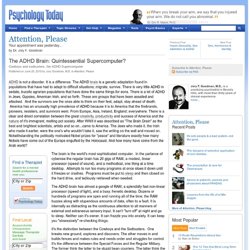
It is a difference. The ADHD brain is a genetic adaptation found in populations that have had to adapt to difficult situations; migrate, survive. There is very little ADHD in sedate, bucolic agrarian populations that have done the same things for eons. There is a lot of ADHD in Jews, Gypsies, American Irish, and so forth. These are groups that have been assailed and attacked.
The brain is the world's most sophisticated computer. The ADHD brain has almost a google of RAM, a splendidly fast non-linear processor (speed of light), and a busy, frenetic desktop. It's the distinction between the Cowboys and the Sodbusters. Linear thinkers describe ADHD as an executive function disorder because folks with ADHD don't think as they do. I'll enlarge upon this in future posts. Adult & Child ADD / ADHD: Attention Deficit & Hyperactivity Disorder. Attention Deficit Hyperactivity Disorder (ADHD) A detailed booklet that describes ADHD symptoms, causes, and treatments, with information on getting help and coping.
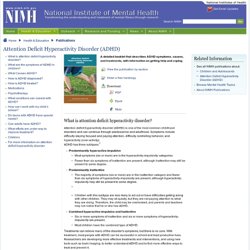
What is attention deficit hyperactivity disorder? Attention deficit hyperactivity disorder (ADHD) is one of the most common childhood disorders and can continue through adolescence and adulthood. Symptoms include difficulty staying focused and paying attention, difficulty controlling behavior, and hyperactivity (over-activity). ADHD has three subtypes: 1 Most symptoms (six or more) are in the hyperactivity-impulsivity categories. Fewer than six symptoms of inattention are present, although inattention may still be present to some degree. The majority of symptoms (six or more) are in the inattention category and fewer than six symptoms of hyperactivity-impulsivity are present, although hyperactivity-impulsivity may still be present to some degree. Children with this subtype are less likely to act out or have difficulties getting along with other children. Talk nonstop Trade Name. NIMH » Publications about Attention Deficit Hyperactivity Disorder (ADHD) Attention-deficit/hyperactivity disorder (ADHD)
Attention-deficit/hyperactivity disorder (ADHD) is a chronic condition that affects millions of children and often persists into adulthood.
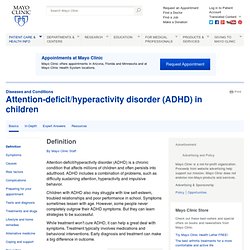
ADHD includes a combination of problems, such as difficulty sustaining attention, hyperactivity and impulsive behavior. Children with ADHD also may struggle with low self-esteem, troubled relationships and poor performance in school. Symptoms sometimes lessen with age. However, some people never completely outgrow their ADHD symptoms. But they can learn strategies to be successful.
While treatment won't cure ADHD, it can help a great deal with symptoms. SymptomsMar. 05, 2013 References. Attention deficit hyperactivity disorder. Attention deficit hyperactivity disorder (ADHD, similar to hyperkinetic disorder in the ICD-10) is a psychiatric disorder[1][2] of the neurodevelopmental type[3][4] in which there are significant problems of attention, hyperactivity, or acting impulsively that are not appropriate for a person's age.[5] These symptoms must begin by age six to twelve and be present for more than six months for a diagnosis to be made.[6][7] In school-aged individuals the lack of focus may result in poor school performance.
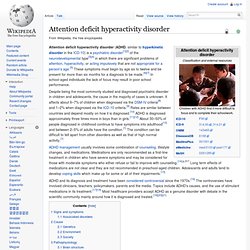
Despite being the most commonly studied and diagnosed psychiatric disorder in children and adolescents, the cause in the majority of cases is unknown. ADHD management usually involves some combination of counseling, lifestyle changes, and medications. ADHD and its diagnosis and treatment have been considered controversial since the 1970s.[16] The controversies have involved clinicians, teachers, policymakers, parents and the media.
Attention Deficit Hyperactivity Disorder(ADHD) Homepage - NCBDDD. ADHD Diagnosis and TreatmentNew data on trends and age of diagnosis.Learn More » Children's Mental DisordersA Journey for Parents and Children Learn More » Medscape VideoADHD: Do parents know If Their Child Has Been Diagnosed?
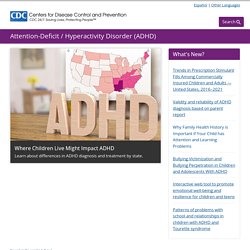
Learn More » Updated GuidelinesChildren can now be diagnosed and treated for ADHD from ages 4 to 18.Learn More » People with ADHD may have trouble paying attention, controlling impulsive behaviors (may act without thinking about what the result will be), or be overly active. Although ADHD can't be cured, it can be successfully managed and some symptoms may improve as the child ages.
ADHD - Recommended resources.